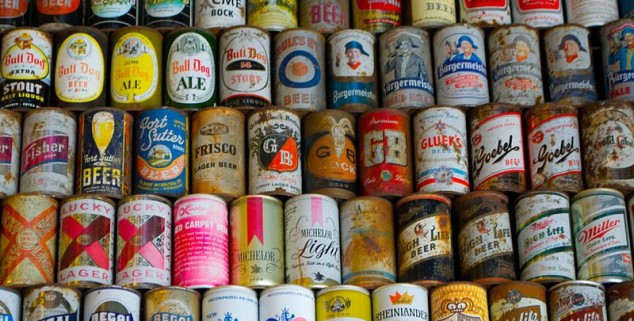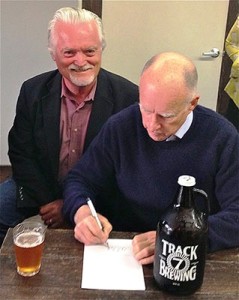News
Beer lovers growling at new law

When Gov. Brown, flanked by a jug of beer and a happy lawmaker, signed AB 647, it seemed he was ushering in a new era for California’s craft breweries and the beer drinkers who enjoy them.
Craft beer enthusiasts hoped the new law would make it easier for them to take a growler — a large, jug-like beer container — purchased at one brewery into a different one and have it refilled there, thus saving them the cost and space of purchasing a new container. The bill was authored by Assemblyman Wes Chesbro, D-Arcata.
Some beer fans are upset that the law doesn’t make a more significant change, but craft brewers stand by their right to make their own policy to protect their businesses and their beers.
But many breweries, including Track 7, the local brewery where Brown signed the bill with a growler by his side, are still determining whether they are willing to do just that, since the bill doesn’t require them to fill containers other than those which are sold at their breweries.
“It’s a very very small, benign change,” said Tom McCormick, Executive Director of the California Craft Brewers Association, which supported the law. While the bill has been touted as a move to allow breweries to refill other growlers, McCormick pointed out that members of the California Craft Brewers Association had already been doing that, and that this law simply clarified the labeling requirements for those that did so.
Some beer fans are upset that the law doesn’t make a more significant change, but craft brewers stand by their right to make their own policy to protect their businesses and their beers.
“When someone brings in a growler that’s already been used by another brewery the brewery that’s reselling it doesn’t know how clean it is,” McCormick said. “So they are potentially putting their product into a dirty container, which can easily and quickly destroy the art — their product that they’re putting in that container.”
Those concerns and the previously unclear policies on growlers were behind the need for this bill, which according to Alcoholic Beverage Control spokesman John Carr, was less a change in policy and more a clarification of how ABC policy should be interpreted.
“With the growth of California’s alcoholic beverage industry, any direction that makes it clear is very helpful to all,” he said. “There was confusion over the law prior to this.”
While the policy specified that only manufacturers and not retailers could refill growlers and that all beer sold in the state must bear the true name and address of the manufacturer and the bottler, it didn’t say how that information should be affixed, leaving room for interpretation.
But the publicity surrounding the bill left some consumers expecting a more substantial change.
“We’re not going to be so militant on that,” said Mike Hess, Chief Brewing Officer at Hess. “We do have policy on which growlers we will fill and which ones we won’t, so there is a criteria.”
Consumers are getting more upset with breweries that aren’t saying, ‘Also any jar you have, doesn’t matter what it is, bring it in,’” said Doug Constantiner of Societe Brewing in San Diego. “We’re not saying that, and people are already threatening ‘Oh, I’m not going to buy as much of your beer.’”
Constantiner and other crafter breweries are resistant to filling just any container due to concerns for the quality beer. Some, like Russian River Brewing Company near Santa Rosa, have made policies refusing to refill other brewers’ growlers. Others, like Hess Brewing in San Diego, have agreed to, but with restrictions.
“We’re not going to be so militant on that,” said Mike Hess, Chief Brewing Officer at Hess. “We do have policy on which growlers we will fill and which ones we won’t, so there is a criteria.”
Hess’ criteria for growlers reflects the concerns brewers have for maintaining the quality of their product when they send it home with consumers.
“Not all growlers are created equal,” McCormick said.
Hess said that he prefers to use a higher quality growler than other breweries might and therefore requires any growler a customer brings in to have dark glass to protect the beer from light damage and a swing top to make sure the sealing mechanism is solid.
Societe has yet to make a final growler policy, but expressed concerns similar to those of Hess.
“We’re not going to fill a clear mason jar that has no label on it because the light can damage the beer and I don’t trust the seal,” Constantiner said.
“Another brewery here in San Diego uses, it almost looks like a beanie, like a hoodie, like a beanie koozie and they’ve been using that to cover up the growlers,” Constantiner said. “I wouldn’t take that risk because the language says not easily removable and they used a paper bag as an example.”
He added, “The number one concern for us above all else is the quality of the growler filled, but tied with that would be keeping it legal also.”
A primary provision of AB 647 will mean some extra work for breweries to do just that, as the bill requires that any accurate labeling affixed to a growler must not be easily removable.
“Another brewery here in San Diego uses, it almost looks like a beanie, like a hoodie, like a beanie koozie and they’ve been using that to cover up the growlers,” Constantiner said. “I wouldn’t take that risk because the language says not easily removable and they used a paper bag as an example.”
Constantiner said that educating the public is likely the biggest challenge of the clarifications the bill makes. Not only do members of the public expect it to be a larger change than it actually is, but he said some brewers are unclear, citing some online forums in which he has seen brewers discuss the law with a great deal of misunderstanding.
Beyond the difficulties some are encountering in understanding and abiding by the law and maintaining the quality of the beer, brewers are simultaneously concerned with keeping profits up.
Hess pointed out that growlers are a major marketing tool for brewers and therefore putting their name on something that could potentially be filled with another product presents a great risk for the brewery.
“Someone could refill growlers with beer that’s not as good and it has your name on it,” he said. “They’re going to have an impression of our brewery that is not the one that we wanted to create in their minds, or in their mouths, for that matter.”
Business considerations are also why breweries oppose the any legal obligations to fill growlers.
“We’re already regulated enough,” Hess said. “That’s a business decision about whether or not we want to fill growlers or not and some breweries will and some breweries won’t
But above all, it comes down to the care brewers put into their beer.
“The consumer has to realize that craft breweries take great great pride in their products,” McCormick said. “It’s not just a commodity that they put into a bottle, a growler, or a keg and kick it out the door and count how many cases they sell. The success of their business and the passion of their business is based on the integrity of their product.
“It’s an art to them so they’re very sensitive to how their products taste when the consumer ultimately consumes and drinks that product, so that’s utmost of importance, he added. “If they can’t be assured of that ,they certainly need to be able to say ‘No, we’re not going to fill that.’”
Down the road, the pressure from consumers and the need for a coherent approach to the growler question may lead to new solutions. According to McCormick, the Craft Brewers Association will be addressing the question of retailers filling growlers in the coming months. And in the long term there may be more innovative solutions.
“I always like the idea of having a California growler,” Constatiner said. “So you have one growler that’s approved by all the members…and that’s what everybody carries, and everybody can fill it, and now you have one standard growler being filled in California.”
Want to see more stories like this? Sign up for The Roundup, the free daily newsletter about California politics from the editors of Capitol Weekly. Stay up to date on the news you need to know.
Sign up below, then look for a confirmation email in your inbox.


Leave a Reply